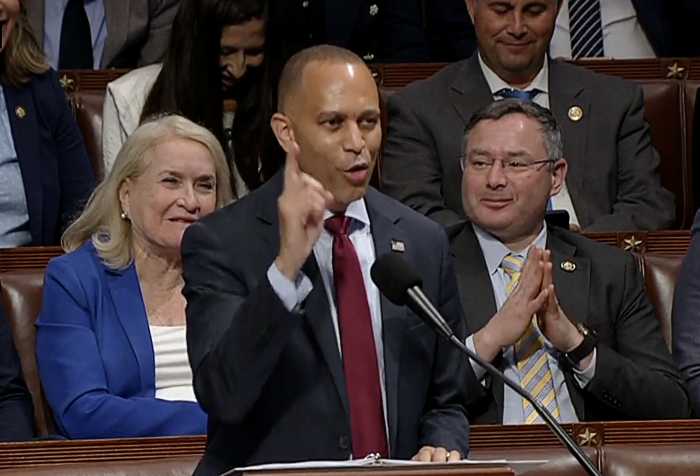by HOWARD GIRSKY As squadrons of helicopters and fleets of trucks invaded City streets for the 12th day even the most stoic of New Yorkers displayed signs of unease as the war against the encephalitis-bearing mosquitoes intensified.
The death toll stood at three and eleven other cases were confirmed at press time by City health officials who indicated that 65 additional cases of the illness —- including one death — were being investigated as possible encephalitis cases.
Fears grew last week over the viral disease that causes brain inflammation and the possible side effects from thousands of gallons of a powerful insecticide called malathion sprayed in every possible habitat in the City. Meanwhile, Borough President Claire Shulman summoned County legislators and media to a briefing on Sept. 13 conducted by City health officials and representatives of the Office of Emergency Services. They reiterated Mayor Rudolph Giuliani’s repeated assurances that the encephalitis outbreak is under control and the intensified spraying posed no risk to the populace.
Shulman’s meeting was called to allay concerns of Queens residents who were alarmed by the weekend bombardment of the pesticide. It led to nagging questions about the outbreak.
Associate Health Commissioner Isaac Weisfuse told his jittery audience that the insecticide has been used for 50 years and was given a clean bill of health by scientific authorities. Weisfuse’s arguments were backed up by the views of other medical authorities across the country and published medical papers obtained by The Queens Courier.
One authority, Professor Frank Schanne of St. John’s University, a toxicologist for the past 25 years, said malathion has had a proven safety record for decades.
"If properly used," he said, "it causes no side effects to the general population."
Schanne was supportive of City Hall declarations that the population is not "susceptible" to the spray.
However, concern was voiced by Virginia Dent, former executive director of the Northeast Queens Historic Preserve Commission, a State body. She currently sits on the New York City Council Soil and Water Conservation Board.
Dent said the pesticide kills bird eggs and birds help rid the environment of mosquitoes.
"This isn’t a problem now," she said, "only during the spring nesting season."
Dent called upon area colleges to look into the role of pesticides and the Borough’s bird population.
"We should find out what price we will ultimately pay for the spraying."
One report from the Florida State Department of Health said malathion had been closely studied for years and "is not a significant risk." The Department called the insecticide "perhaps the most commonly used home and garden insecticide and has been used in 33 counties in Florida for mosquito abatement."
A report from the Environmental Protection Agency said malathion was much less toxic than other pesticides available. It also cleared the product from any risk of birth defects.
Malathion was used in combating the Med-fly in California in 1989-90 and scientists concluded at that time that although there was some skin irritation, they could find "no solid evidence of any instances in which malathion has caused illness in any "sensitive" people.
Despite these assurances residents and some Queens legislators expressed concern over the massive use of the pesticide. Parkgoers in Flushing Meadows-Corona Park on Sunday were startled and apprehensive when a helicopter spraying the pesticide buzzed at a low level repeatedly over the Queens Zoo and Hall of Science and near the U.S. Open where the men’s finals were taking place. Park visitors could be seen covering their faces and scurrying to get their children out of the park. "Why didn’t they give us notice before they started spraying" said Rose Ciccio of Corona. A "Mister Softee" ice-cream vendor near the Zoo said "That helicopter was sure scary. I hope my ice cream was not affected by that thing," he said.
A videotape made by The Courier from a 30th floor view overlooking most of Queens recorded the helicopter spraying from Northeast Queens to Forest Hills, Elmhurst, Jackson Heights, Astoria and Long Island City from 5 p.m. well into the late evening.
Dr. Weisfuse of the City Health Department conceded that preventive spraying at regular intervals over the years could perhaps have minimized the encephalitis outbreak.
"There are no studies to confirm that," he said, "but it makes common sense."
Health officials said that the two additional confirmed cases involved a 15-year-old who is in stable condition and the other is of a 38-year-old who has been released from the hospital. Three other cases are borderline.
"The appearance of this virus in a younger population is not unexpected, but the elderly are still much more vulnerable to becoming seriously ill," Giuliani said. "Nonetheless, all New Yorkers should take precautions against mosquito bites."
Jerome Hauer, director of the Mayor’s Office of Emergency Management (MOEM ), said "we have completed this round of aerial and ground spraying of the five boroughs before resuming these preventive activities in the next several days, weather permitting"































